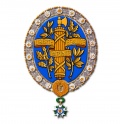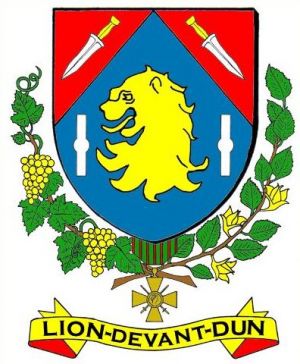Lion-devant-Dun: Difference between revisions
Knorrepoes (talk | contribs) m (Text replacement - "===Official blason=== *(fr) " to "{| class="wikitable" |+Official blazon |- |'''French''' | ") |
Knorrepoes (talk | contribs) m (Text replacement - "{{media}} Literature : Image from http://www.armorialdefrance.fr" to "Literature : Image from http://www.armorialdefrance.fr {{media}}") |
||
| Line 25: | Line 25: | ||
The branches around the shield refer to the former importance of viticulture until the ''Phylloxera'' attack in the mid-19th century. The beech branch refers to the forest in the municipality. | The branches around the shield refer to the former importance of viticulture until the ''Phylloxera'' attack in the mid-19th century. The beech branch refers to the forest in the municipality. | ||
[[Civic Heraldry Literature - France|Literature]] : Image from http://www.armorialdefrance.fr | |||
{{media}} | {{media}} | ||
[[Category:French Municipalities L]] | [[Category:French Municipalities L]] | ||
[[Category:Meuse]] | [[Category:Meuse]] | ||
[[Category:Granted 2019]] | [[Category:Granted 2019]] | ||
Revision as of 12:23, 7 September 2022
French heraldry portal
This page is part of the French heraldry portal |
Heraldry of the World |
|
French heraldry:
Overseas territories:
|
Selected collector's items from France:
|
LION-DEVANT-DUN
Département : Meuse
| French | D'azur à la tête de lion d'or accostée de deux vergettes alésées et nouées d'argent; chaperonné cousu de gueules à deux poignards romains d'argent garnis d'or, abaissés et posés celui de dextre en barre, celui de senestre en bande. |
| English | No blazon/translation known. Please click here to send your (heraldic !) blazon or translation |
Origin/meaning
The arms were officially adopted on April 3, 2019.
The lion's head is a canting element for Lion. The top part of the arms refers to the Côte de Saint-Germain hill, the highest part of the municipality and a nice viewpoint. The division also refers to the local patron saint, St. Martin of Tours, who cut his cloak for a beggar.
The two roman daggers (Pugios) are a symbol for the Roman Arimont camp or fortress in the municipality. The two arrow-splits are a symbol for the well-known archers of the castle in the village.
The branches around the shield refer to the former importance of viticulture until the Phylloxera attack in the mid-19th century. The beech branch refers to the forest in the municipality.
Literature : Image from http://www.armorialdefrance.fr
Contact and Support
Partners:
Your logo here ?
Contact us
© since 1995, Heraldry of the World, Ralf Hartemink 
Index of the site












